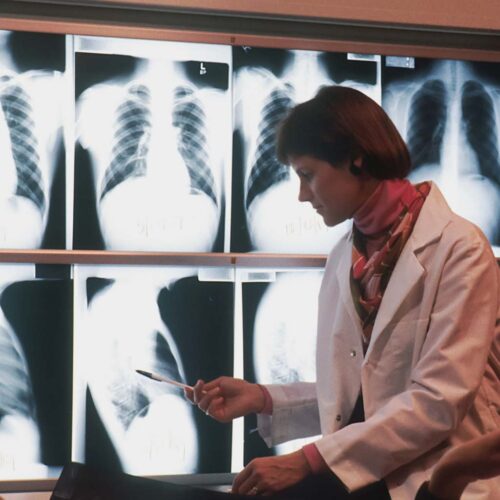
Cancer Control

Cancer is the second-leading cause of death in Michigan. To promote cancer prevention and early detection, and enhance the well-being of Michiganders, our cancer control initiative supports healthcare teams who are targeting interventions for lung cancer screening and tobacco cessation. This effort is aligned with the Michigan Cancer Plan, 2021 – 2030, and the Centers for Disease Control and Prevention’s (CDC) goal to improve cancer outcomes.
iMPROve Health Can Help

We Offer Team Care Education
Conduct free one-hour, on-demand and live virtual training sessions for healthcare teams, covering lung cancer screening, identifying and referring eligible patients, and tobacco dependence treatment resources.
To schedule a live virtual training, contact Julee Campbell.

We Are Increasing Community Awareness for Early Detection
Share tailored resources to increase care team and community knowledge of lung cancer, risk factors, prevention and recommended screening.
Bring healthcare teams and organizations together to strategize about how to improve prevention and early detection of lung cancer in Michigan through ECHO programming.

We Are Personalizing Technical Assistance
Help participants implement referrals to tobacco dependence treatment services, including the Michigan Tobacco Quitlink and other local resources.
Help participants implement and refine processes for identifying patients eligible for lung cancer screening and screening referral processes.

We Are Leveraging Data
Incorporate the use of electronic health records (EHRs) and streamline processes for assessing patients who are due for lung cancer screening to drive quality improvement efforts.
Implement provider and client reminder systems to encourage timely screening.
Lung Cancer and Tobacco Cessation
Smoking is associated with about 90% of lung cancers, and quitting smoking can improve cancer treatment effectiveness, survival rates, and quality of life. (MDHHS)
Lung cancer is the leading cause of cancer deaths in Michigan. While new cases and deaths from lung cancer are declining, both continue to exceed national averages and are highest in American Indian men and women. Lung cancer screening with low-dose computed tomography (LDCT, or low-dose CT) has been shown to decrease mortality, but only 16% of the recommended population report ever having a low-dose CT scan. (MDHHS)
By increasing provider knowledge of prevention practices, screening eligibility criteria, and early detection methods like low-dose CT screenings, iMPROve Health and the State of Michigan are working together to reduce lung cancer and the tobacco-use burden in our communities.
Links:
On Demand Education
iMPROve Health developed our lung cancer screening learning session to support care teams in developing a referral process for lung cancer screening. The learning session shares information on current screening recommendations, how to identify and refer eligible patients to screening, and resources to promote tobacco cessation.
Audience:
Physicians, primary care teams, and anyone interested in learning more about lung cancer screening.
Learning Session Objectives:
- Explain statewide prevalence of commercial tobacco use, lung cancer incidence and mortality, and the importance of early detection.
- Describe lung cancer screening recommendations, eligibility criteria, benefits, risks, and costs.
- Understand how to identify eligible patients and conduct counseling and shared decision-making visits.
- Identify quality measures that will be impacted by referral processes for lung cancer screening.
- Find strategies and resources for promoting lung cancer screening and commercial tobacco cessation.
Resources
Michigan Cancer Control Initiative
iMPROve Health is a member of the Michigan Cancer Consortium (MCC). For more information from the MCC, visit their website.